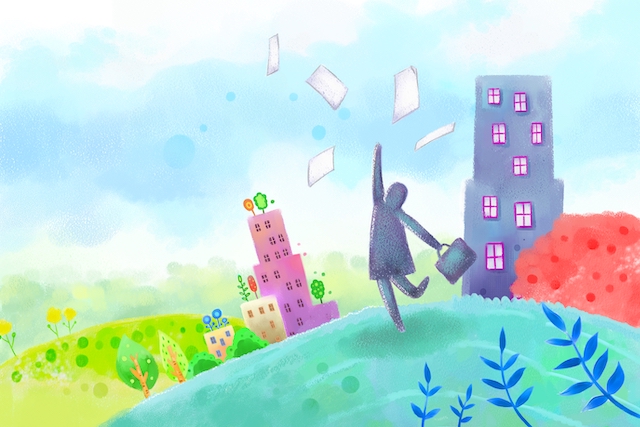
“We first make our habits, then our habits make us.” ~John Dryden
This may look good, sound good, and maybe even feel good at first, but it’s not serving you well in the end!
I’d hear this thought in my head over and over and still not believe it. But it had persisted ever since I started questioning the status quo in my life. And I don’t mean a loud, in-your-face, obnoxious line of questioning, but rather, a gentle curious whisper that asks: Well, why does it have to be this way, if I may ask?
Questioning the status quo is not a novelty in our modern society, but here’s the thing: I was questioning the good stuff, like great habits that I grew up with and ideals that are the foundation of my value system.
In a sad way, the thought made sense. Every time I’d finish going through the motions of one of my “great habits,” I’d feel drained, in a funk, out of sorts, exhausted, but not in an accomplished kind of way.
So I started adjusting my autopilot habits and I’m already feeling a shift toward serenity. I suppose this is the counter-intuitive inner work that makes self-discovery so much fun, right?
So, ready to question some of your great habits too? Check to see if you fall in the trap of a great habit that may not be serving you.
1. The habit of working hard at the exclusion of all else.
For the first six years of my corporate job, I was a complete workaholic. Those first years were also the least rewarding, financially and emotionally, because I neglected the more essential aspects of building a career, such as creating relationships and building trust.
Most of us are hard workers and we identify a sense of pride with it too. It’s how we were brought up; it’s what society expects and rewards.
Just beware the trap of hard work, especially if you’re using it as a Band-Aid on something that hasn’t given you results, such as working even harder to get ahead at work or to please someone in a relationship.
What to do instead: Pause long enough to examine the big picture and the situation at hand, and question your current approach. Is more work going really to give you the results you need?
2. The habit of taking care of everyone and everything else first.
I watched my mom make a lot of sacrifices for us over the years, but even as a kid I could see that a lot of them were at the expense of her own livelihood. I noticed that this made her bitter. While everyone around her was grateful, she did not need to go that far. She could be self-nurturing and caring to the rest of her family.
You may be a loving mother (or father or sibling), caring and giving, but to a fault.
You take care of everyone and everything else—even the laundry and the dishes!—before taking care of yourself. Sometimes at the expense of it. You’re sacrificing your own well-being because you don’t want to seem selfish.
What to do instead: Know that sacrifice does not earn the respect or gratitude of others. Being a good role model does. Take care of yourself so you’re strong and healthy for the important people in your life. It’s not selfish. It’s self-nurturing, it’s necessary, and you’re allowed.
3. The habit of listening to everyone’s problems without boundaries.
As an immigrant to the US, I was so hungry for making friends that I was over the moon if someone confided in me.
This habit grew into a habit of listening without any boundaries, and so I became the place my friends deposited all their problems. When I saw that it wasn’t helping them and it was wearing me down, I had to draw the line.
Listening is a gift, and if a friend needs to be heard, if a parent needs to voice concerns, if a spouse needs to vent about work, if a co-worker needs to complain, who better than a great listener?
Just watch out because being the bank where everyone deposits their complaints, outrage, sorrow, and pity can have its negative consequences and take its toll on you.
What to do instead: Listen enough to hear the initial problem, then gently move the conversation toward finding solutions, being optimistic, and focusing on the positive. If they still need a professional therapist, remember: it’s not your job to be one!
4. The habit of responding to every call to attention—email, phone, text—right away.
It’s wonderful to be responsive. I love responsive people, and I do my absolute best to get back to people. But this constant distraction can ruin your focus, disrupt your routine, and cause problems when running a business.
What to do instead: Be more stingy with your time and set aside dedicated slots to respond to texts, emails, and phone calls. Unless it’s an emergency, it can wait. Because this one’s deeply ingrained, train yourself little by little to master this one.
5. The habit of offering your expertise, products, or services free or cheap to friends and family.
My sister-in-law is a doctor and her generosity toward my family’s health questions knows no end. Sometimes, I feel that we abuse her medical expertise.
Whatever side of the situation you may be on—giving or receiving the deed—going too far can have an adverse short- or long-term effect on the relationship.
What to do instead: Set clear boundaries; give and ask for respect in this regard. It’s totally fine if you don’t want to offer your services or products at a discount or free just because people are related to you. It makes you a professional, that’s all.
6. The habit of getting straight A’s in every class in your life.
Ah, the A student dilemma! Every culture and society praises the A student and frowns on the C student. As a straight-A student my entire life, I can clearly see that it robbed so much happiness and fun out of my life.
If I could go back, I’d settle for B- and more fresh air and yoga, thank you!
What to do instead: Decide first if you even want to go to university or graduate school. Then define your own measure of success and stick to it. Learning and applying the knowledge is way more important than the final grade from your teacher so focus on that.
7. The habit of doing everything for your kids or students or elderly parents.
My mom has an aunt who still cooks and cleans for her thirty-five-year-old daughter, who’s a perfectly capable woman.
Do you do everything for others instead of showing them how to do it? Sometimes people need help, but if you condition them to having you do it all the time, they never become self-sufficient. You do them and yourself a disservice.
What to do instead: Before doing the next task for the person you’re helping, ask them if they’d like to learn how to do it. Start teaching and showing more and doing less.
8. The habit of pleasing others at the expense of your own dreams and desires.
The hardest part of quitting my job and starting my business was that I was going against my parents’ wishes for me. It was hard but absolutely and positively the only right path for me.
We are conditioned to say “yes” to please our family and loved ones. This can be detrimental to your happiness if you happen to want something else.
What to do instead: Be true to yourself. You can still be kind and gentle toward others, but you get one life, and your dreams and desires are your business, and they deserve your best shot.
—
Your turn now: Do any of these great habits make you pause and think? What other good habits have you found to get in the way of happy living?
About Farnoosh Brock
Farnoosh Brock is a published author, speaker and coach. After her corporate career, she started Prolific Living which she now runs with her husband. She loves traveling, green juicing, Ashtanga yoga and fantasy fiction. Grab her FREE affirmation morning audio.













 Though I run this site, it is not mine. It's ours. It's not about me. It's about us. Your stories and your wisdom are just as meaningful as mine.
Though I run this site, it is not mine. It's ours. It's not about me. It's about us. Your stories and your wisdom are just as meaningful as mine.
Hi Farnoosh,
I liked your post, especially the last point about doing a line of work that is pleasing to ourselves first and firmost regardless of what family or friends might think. I’m actually going through something similar right now after quitting my job and choosing to start my own business which did not get my family’s approval. I come from a traditonal family where everyone is in everyone else’s business. I am learning to trust myself and the decisions I make and see it as an opportunity to practice this more deeply considering my family does not believe I made the right choice.
Best regards,
Hi @disqus_ft1IKJ1Cyi:disqus, I’m so happy to hear you are starting your own business and it’s too bad about family approval – I didn’t have mine either but we are grown people now, right? It sounds like you may be from the same corner of the world that I”m from – Iran here, you? If so, I totally get the culture and that makes you even MORE courageous!
Thank you so much for having me back at TinyBuddha, Lori and community. 🙂
I’m not sure I can agree with the part about listening to others. Most of the time when people are going through tough times, they don’t always need us to find solutions for them or be optimistic. They just need us to listen and just be with them for a while. I don’t think this does take its toll. The problem is that people don’t just sit and listen to each other enough. So, whilst its not our job to be a therapist, as you put it, I do think it is important to listen without judgement, without trying to offer solutions or answers, just to let someone be heard and accepted.you can do this without taking responsibility for them or their stuff, and it doesn’t take its toll. In fact just being and allowing another to be whilst in the same space can be really energising. Its a lovely, powerful thing to do that benefits everyone.
Hi Helen, as long as it does not drain you and bring your spirits down, then yes it can be very kind and generous to listen to others – notice I said not to do it without boundaries – I was talking about those who take advantage of your time such as office gossipers or random people who just want to vent. So glad to hear your thoughts nonetheless 🙂
I’ll also add to what Farnoosh has said that bear in mind your energy (and I DON’T mean that in a weird metaphysical way, just a normal practical way) is very much influenced by the kinds of people you hang around and the kind of energy they are sending out. if you can hear people as they say their problems and you aren’t too judgemental etc etc, this is all very great and noble stuff and I’m sure very helpful, but just bear in mind that if you are spending 99% of your time listening to depressed people complain about things (and I really don’t mean that offensively, but this is sometimes what it ultimately comes down to) then that may be having an adverse effect on your own spirit.
If it’s not then fine, but I agree with what Farnoosh said. Personally I would rather surround myself with positive, inspirational people. Is that selfish? I don’t see it that way at all, because if I have a more positive, more excited energy then I can create better, more powerful stuff and therefore serve in this world in a more effective way. And I can also more easily transmit that positive energy out.
(One last time: I don’t mean energy as a weird metaphysical thing but you’re free to see it that way if you are so inclined!)
Thanks for sharing this Farnoosh! Number 4’s an absolute killer. Especially if you’re in a career that revolves around emails and phone calls. It can be difficult to prioritize properly and know which tasks you can leave till later on.
Hey @danwestern:disqus, I WAS in careers that involved all those and I learned that the most successful people responded in their time and they were not reactive to their circumstances – you can train your peers and colleagues and have new agreements so you are able to focus on other things outside of always being hooked on email/phone.
Great post. No nonsense, practical stuff.
Great to hear you saw it that way @disqus_Eemh3WzbZl:disqus – practical is my middle name 🙂
Thanks Farnoosh,
This is one of the best article, I found interesting and useful.
The following sentence repeats my feelings also.
“As a straight-A student my entire life, I can clearly see that it robbed so much happiness and fun out of my life.”
Thanks for sharing this nice article.
Thanks @maheshsahu:disqus for such lovely words. I’m glad we connected on that subject in particular :)!
Hello Farnoosh,
I so enjoyed your post – thank you. I have made just about all of the mistakes above – now I do “ring-fence” my duties and will continue to unless a dire emergency dictates otherwise. You will know that they call it “The Middle Way” because all extremes are to be avoided – being too generous can be as oppressive and controlling as being too mean.
By the way, regarding your sister-in-law, the doctor, I appreciate she may not be able to be anything but helpful to her family, but do advise her to disguise her profession to others because if not, people will take advantage of her repeatedly and without any shame! I am told “civil servant” is a good alternative!
I look forward to more of your useful posts. Thank you.
Beautifully written; very important for anyone to read. In my case, I am a student and several points touched me personally.